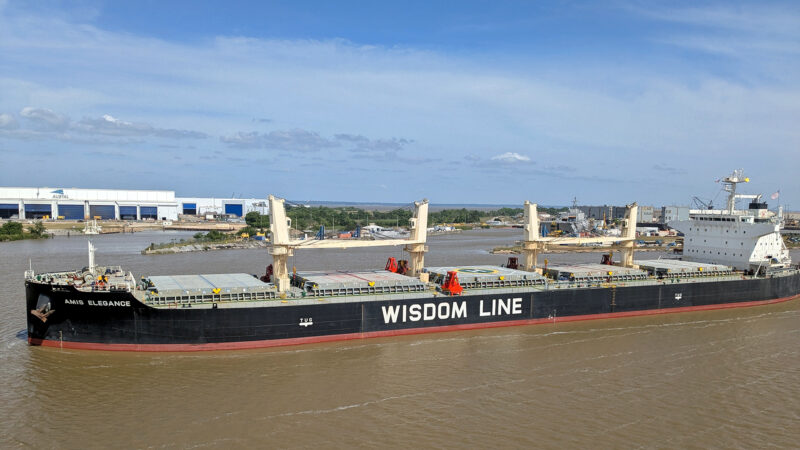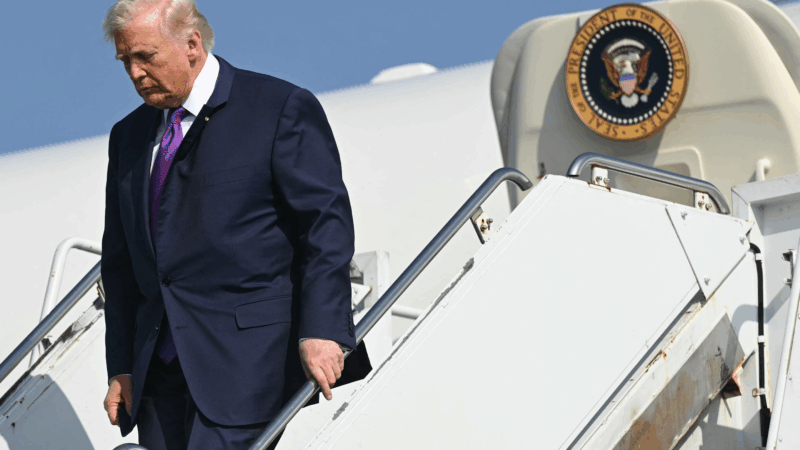Trump’s plan to bring shipbuilding back to the US? Port fees on Chinese vessels
While the trade war between China and the United States is simmering down, a 30% tariff remains on Chinese imports. And President Donald Trump’s administration has another policy on the way that will make free trade even more expensive.
Chinese built, owned or operated commercial ships must pay a new port fee on trips to the U.S. starting in October. Based on cargo size, that could lead to some ships operators paying an additional $1 million, or more, per U.S. trip.
The administration’s goal for the fee is to reboot the failing U.S. commercial shipbuilding industry by raising costs on the Chinese vessels that dominate sea lanes. While China pumps out more than a thousand ships each year, the U.S. builds five or fewer, according to a 2023 report for Congress.
This goes beyond wanting to boost another manufacturing sector. America’s weak commercial fleet has long been a national security concern of policy makers and think tanks since the vessels could be needed for supply lines during wartime.
U.S. shipbuilders, including Mississippi’s largest employer Ingalls Shipbuilding, are optimistic about the federal support. But hundreds of public comments show companies that rely on international trade, from Louisiana’s maritime industry to Alabama coal miners, believe this will only harm American trade and businesses.
This new fee could also drive down traffic to American ports, as Trump’s tariffs have already made some of the country’s busiest ports not so busy. Ironically, it’s also led to fewer ship voyages, let alone a demand for new ones to be built.
“I don’t know why you would invest in a ship right now,” Mike Lee, president of the shipping logistics company Page and Jones in Mobile, Alabama, said. “Even an American flag ship.”
A national security threat
National security has been the phrase of choice by the Trump administration to justify a wide range of policies. When it comes to U.S. shipbuilding, experts say the term fits.
A prime example is the importance of commercial ships during and after World War II. The U.S. built hundreds of cargo ships out of Mobile, Alabama, called Liberty ships. Their role was so vital to the war effort, Germany sent U-boats to destroy the transports to prevent supplies from reaching Europe. The U.S. eventually ramped up production and defense of the vessels to where the Germans couldn’t sink them faster than the U.S. could build them.
American then went through the effort of keeping those victory ships around for decades, mothballed and docked in the Tensaw River near the Port of Mobile in case they were needed in future conflicts.
“When you think about war, we always think about the sharp end of the spear,” said John Sledge, the maritime historian-in-residence at The National Maritime Museum of the Gulf. “But all of that support and logistics is absolutely vital.”
Today, that ghost fleet, as it was known, is gone. The U.S. shipping building industry, however, doesn’t share its watery grave entirely. The country still builds plenty of navy ships, but construction of commercial vessels has all but disappeared.

Policymakers have warned this is a severe strategic disadvantage. America might be able to lease vessels from other countries during wartime, but that’s not going to happen if the ones holding those ships are America’s adversaries.
“What if we’re in a war with China?” said Bradley Byrne, former Alabama District One congressman and president of the Mobile Chamber of Commerce. “We can’t use their ships. So this is a national security problem as much as it is a problem for our economy.”
Balancing the price scale
The U.S. commercial shipbuilding industry is smaller today because of how much cheaper it is to build in China. There, a vessel can be constructed for just a fraction of the U.S. cost due to cheaper labor and looser regulation.
To balance those price scales, the administration is attempting to make it cheaper to build U.S. ships. Trump signed an executive order in April with a wide range of policies including creating a financial incentive program and looking for deregulation opportunities.
The other tactic is to make Chinese-built ships more expensive, which is where the new port fees come in. The fee will charge $50 per net tonnage before increasing after three years.
The U.S. industry praised the policies, with the Shipbuilders Council of America responding that “U.S. shipbuilders stand at the ready!”
HII, the U.S. military shipbuilding company which owns Ingalls Shipbuilding, recently held a public earnings call where president Chris Kastner said there were plenty of tailwinds behind shipbuilding at the moment.
“Now it’s not easy. It takes time. These are heavy manufacturing facilities and equipment,” Kastner said during the earnings call. “But I think it’s only positive for HII and positive for shipbuilding.”
Representatives for the company declined to comment further for this story.
Little optimism outside the shipyard
The optimism at the shipyards does not extend to the companies that rely on those vessels, though.
An earlier version of the policy, which would have included a flat $1.5 million fee, received hundreds of public comments, many in opposition. The Alabama Mining Association warned there are not enough American-made ships to fill the demand for the coal they export for making steel.
“This will have a ripple effect through the industry from the mine site, through the river and rail system to the ports throughout the United States,” the association wrote.
The Louisiana Maritime Industry said this would reduce the country’s trade competitiveness and force U.S. companies that rely on trade out of business. It also hinted that inflation wasn’t far behind.
“The end consumer, the U.S. Citizen, would be expected to absorb some, most, or all of the increase on products,” the comment read.
Byrne at the Mobile Chamber said while he agrees it’s critical to remake the country’s commercial shipping fleet, he wants to see more carrots to encourage building new shipyards — which will take years to complete — before bringing out the stick with these port fees.
“You can beat me with that fine stick all you want, but that’s not gonna incentivize me to go out and build a shipyard that costs hundreds of millions of dollars,” Bryne said. “Then wake up the next day and find out I don’t have a market for the ships that I can produce in that shipyard, so I’ve lost that investment.
“We’ve got to focus more on the carrot and less on the stick.”
This story was produced by the Gulf States Newsroom, a collaboration between Mississippi Public Broadcasting, WBHM in Alabama, WWNO and WRKF in Louisiana and NPR.
Court clears way for Louisiana law requiring Ten Commandments in classrooms to take effect
The 5th U.S. Circuit Court of Appeals has cleared the way for a Louisiana law requiring displays of the Ten Commandments in public classrooms to take effect.
From cubicles to kitchens: How empty offices are becoming homes
Many U.S. cities have too many office buildings and not enough homes. Developers are now converting some old offices into apartments and condos, but it's going slowly.
Opinion: The enduring dignity of Jesse Jackson
Rev. Jesse Jackson died this week at age 84. NPR's Scott Simon remembers covering Jackson's 1984 presidential campaign in Mississippi.
A huge study finds a link between cannabis use in teens and psychosis later
Researchers followed more than 400,000 teens until they were adults. It found that those who used marijuana were more likely to develop serious mental illness, as well as depression and anxiety.
‘Given a gun and sent to die’: Kenyans lured to fight for Russia in Ukraine
Kenya's intelligence service warns that over 1,000 citizens may have been recruited to fight for Russia in Ukraine, many under false pretenses.
With U.S. forces in position, Trump mulls his options for Iran
President Trump says he hasn't decided whether to attack Iran. While he weighs his options, a military buildup over the past month means the U.S. now has an expansive presence in the region.







